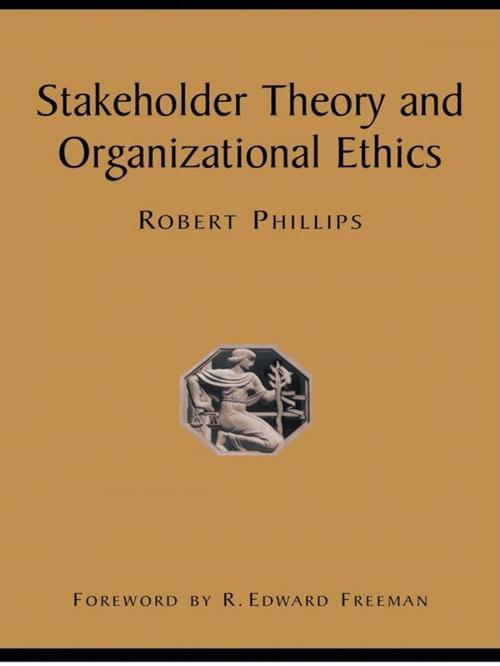Stakeholder Theory and Organizational Ethics
Business & Finance, Business Reference, Business Ethics| Author: | Robert Phillips | ISBN: | 9781609943943 |
| Publisher: | Berrett-Koehler Publishers | Publication: | September 3, 2003 |
| Imprint: | Berrett-Koehler Publishers | Language: | English |
| Author: | Robert Phillips |
| ISBN: | 9781609943943 |
| Publisher: | Berrett-Koehler Publishers |
| Publication: | September 3, 2003 |
| Imprint: | Berrett-Koehler Publishers |
| Language: | English |
Business ethics is a staple in the news today. One of the most difficult ethical questions facing managers is, To whom are they responsible? Organizations can affect and are affected by many different constituencies-these groups are often called stakeholders. But who are these stakeholders? What sort of managerial attention should they receive? Is there a legal duty to attend to stakeholders or is such a duty legally prohibited due to the shareholder wealth maximization imperative? In short, for whose benefit ought a firm be managed? Despite the ever growing importance of these questions, there is no comprehensive, theoretical treatment of the stakeholder framework currently in print. In Stakeholder Theory and Organizational Ethics, Robert Phillips provides an extended defense of stakeholder theory as the preeminent theory of organizational ethics today. Addressing the difficult question of what the moral underpinning of stakeholder theory should be, Phillips elaborates a "principle of stakeholder fairness" based on the ideas of the late John Rawls-the most prominent moral and political philosopher of the twentieth century. Phillips shows how this principle clarifies several long-standing questions in stakeholder theory, including: Who are an organization's legitimate stakeholders? What is the basis for this legitimacy? What, if any, are the limits of stakeholder theory? What is the relationship between stakeholder theory and other moral, political, and business ethical theories? Applying research from many related disciplines, Stakeholder Theory and Organizational Ethics is an overdue response to several long-standing and fundamental points of contention within business ethics and management theory.
Business ethics is a staple in the news today. One of the most difficult ethical questions facing managers is, To whom are they responsible? Organizations can affect and are affected by many different constituencies-these groups are often called stakeholders. But who are these stakeholders? What sort of managerial attention should they receive? Is there a legal duty to attend to stakeholders or is such a duty legally prohibited due to the shareholder wealth maximization imperative? In short, for whose benefit ought a firm be managed? Despite the ever growing importance of these questions, there is no comprehensive, theoretical treatment of the stakeholder framework currently in print. In Stakeholder Theory and Organizational Ethics, Robert Phillips provides an extended defense of stakeholder theory as the preeminent theory of organizational ethics today. Addressing the difficult question of what the moral underpinning of stakeholder theory should be, Phillips elaborates a "principle of stakeholder fairness" based on the ideas of the late John Rawls-the most prominent moral and political philosopher of the twentieth century. Phillips shows how this principle clarifies several long-standing questions in stakeholder theory, including: Who are an organization's legitimate stakeholders? What is the basis for this legitimacy? What, if any, are the limits of stakeholder theory? What is the relationship between stakeholder theory and other moral, political, and business ethical theories? Applying research from many related disciplines, Stakeholder Theory and Organizational Ethics is an overdue response to several long-standing and fundamental points of contention within business ethics and management theory.















